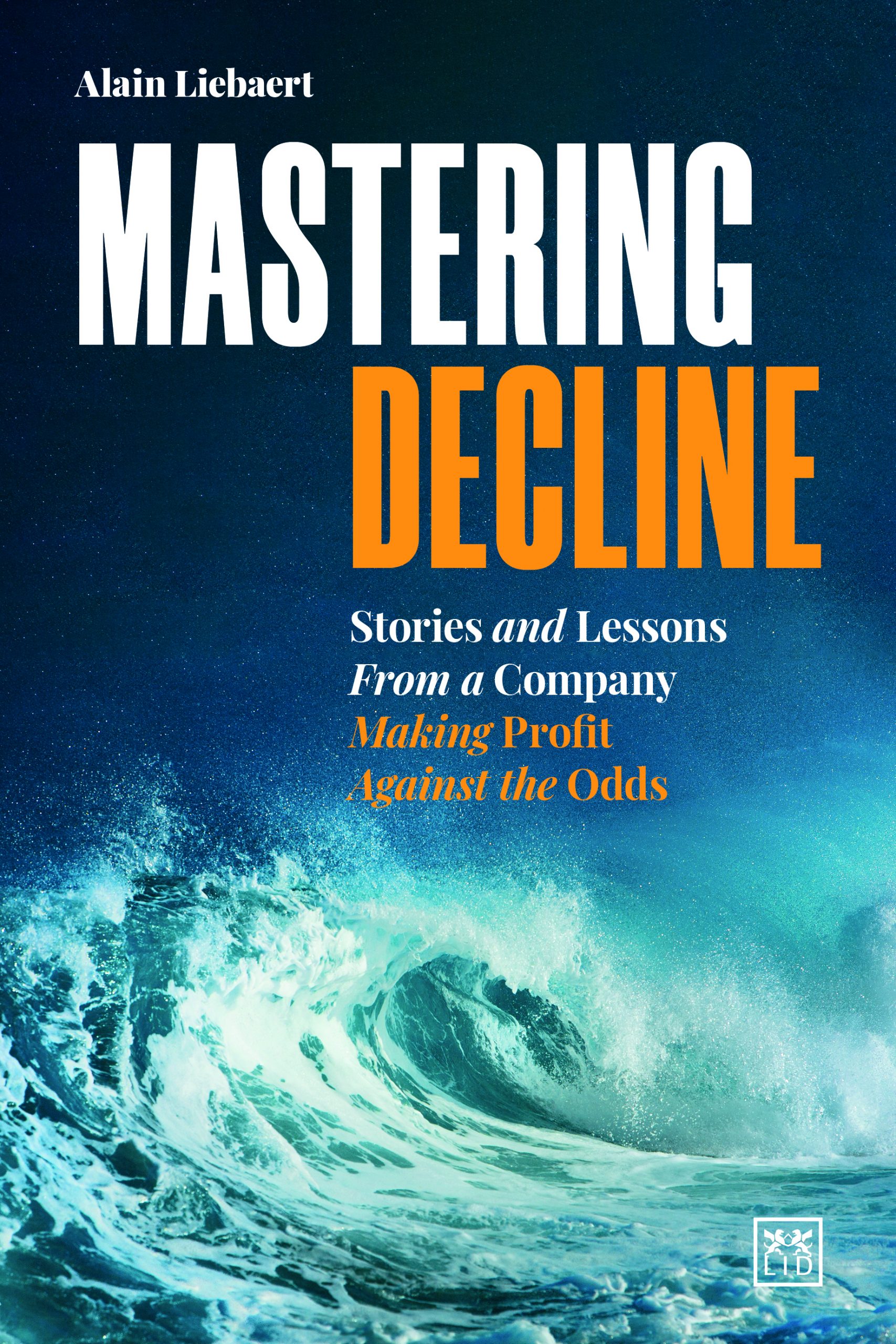|
Top six points every company in a declining market should focus on to survive and thrive by Alain Liebaert
By Guest Contributor Alain Liebaert
Running a company in a declining market is never easy. Being able to survive and keep your business afloat in such a situation takes a lot of resilience and being able to make difficult decisions. I’ve been running a textile company for more than 30 years. The textile industry has been in a decline for many years now and the main reason for that is the shift of the manufacturing industry to Asia. So, to be able to keep the company profitable and thriving in Europe we needed to focus on six key points:
- People
- Product
- Structure
- Money
- Evaluation
- Outside forces
People
You simply cannot run a company without people. It’s almost impossible to do it all yourself and in order to keep your sanity, you must delegate. To do that, ensure you have people around you that you have confidence in.
Remember that you have no greater asset than the people inside your company. Know what they need to be happy, healthy and successful in their roles. Know how to help your employees excel. Have a system of framework that guarantees effective performance – this can come from teaching, training, delegating and motivating. Tell your employees what you want them to do, show them how to do it, let them get on with it and encourage them to do better.
This will help you build a resilient team that will stay loyal to you when difficult times approach and, believe me, such times will hit if you operate in a declining market.
Product
Know your product. Know your process. It’s pretty much as simple as that.
Your product is the very material of your business – it’s the lifeblood of business. You need to know every part of the process that keeps your product in operation. If something goes wrong, you have to know how to find the problem but also how to fix it. When managing a decline, it is paramount to have a thorough knowledge of your production process, both from the technical side and from the planning side. It’s also vital that you have a thorough knowledge of your cost price and margin structure.
If you’re like me, marketing is not something that excites you, quite the opposite actually. But it’s inevitable if you want to be able to sell your product. If you’re operating a company in a declining market, your budget is probably limited. Embrace social media and digital marketing – with the right strategy they can be an effective way to promote your product for free or for very little cost.
Structure
Your structure should adapt over time to the conditions it finds itself in. If that’s not possible, you’re unlikely to survive. Poor structures don’t stand up to strong winds. What keeps a structure safe in the face of adversity is flexibility. Build flexibility into both the horizontal and vertical axes of your business.
- Horizontal
The different departments of your company require a unique skill set. But that doesn’t mean you should restrict your employees to one department only. Train some of your staff in two or three different departments. This will both make their professional life more interesting and will help you when you need an extra hand in one department or another.
- Vertical
If managers and executives can do administrative and secretarial work, and if engineers can do technical and unskilled labour once in a while, it is possible to correct all of an organization’s little kinks and flaws. This will dramatically enhance communication and motivation, and many improvements can be made as a result. The big lesson here is that the only way to improve subordinates’ jobs is by doing them yourself for a while and understanding the issues they face. Similarly, if you give them the responsibilities of their managers, your employees will understand the managerial job is not as easy as it looks.
Money
In a declining market, your money situation is difficult but also relatively simple – you just can’t afford anything. An important rule to follow is to always generate cash flow. If you feel it is going to be negative for a period of six months or longer, consider either closing your company or dramatically reorganizing it. Investments may be the safe boat for your business but you should remember they consume cash and if you change your mind, most of the time you can’t get rid of what you’ve invested in. However, if any investment saves you money, time, or both, it’s worth the risk. But always consider it carefully.
Evaluation
Know your numbers. All of them. And don’t expect someone else to do it for you.
If you’re running a business in a declining market you have three options – to keep running it, sell it or close it. In order to determine the best one for you, you need to be able to evaluate your company.
- Assets – they are your primary source of value. They could be your properties, your stock, your investments, your customers, or even something intangible and intellectual like your brand. You should assess them regularly and know their worth inside out, back to front and upside down.
- Liabilities – if assets are your main source of value, your liabilities will tell you where you got the money to create this value. They can be your capital and reserves, your dept or your suppliers. Some of your liabilities are necessary and expected, while others only manifest if you choose to buy into them.
- Profit and loss – this is your scoresheet. Keep a clean sheet and you’re home and dry. Know your cost price structure by heart. You should be on top of your numbers. Know your average price and your margin on each product. It’s absolutely vital that you’re also on top of your costs – weed out any unnecessary ones.
To decide whether to continue running the company, sell it or close it, consider:
- The net asset value (NAV)
- The closing value – the NAV minus the cost of social liabilities and a very critical assessment of your inventory
- Your company’s cash flow or profitability value going forward
Outside forces
Your company is not an isolated ecosystem. There are obligations to the outside world that will come calling on a regular basis. It’s best to know what they are and how to answer their demands. This comes from obsessive homework and complete awareness. Keep on top of cultural expectations, legal regulations and what your government can do for you.
Managing a declining company requires a complete set of skills. You must be an octopus. Business is not an exact science. Every input leads to a different output. There are too many moving parts. It’s what makes business interesting and worthwhile – but also insidious, stressful and consuming. It is a game of emotions and an infinite game at that.
ABOUT THE AUTHOR

Alain Liebaert started his career as a management consultant, specializing in reorganizing companies on a ‘no cure, no pay’ basis. Following the death of his father, Alain entered the family business – Liebaert Textiles – and eventually became CEO, where he turned the business around in a declining market. After 30 challenging years, he left the family business in the capable hands of his children (the fifth generation), only to return to his old love of management consulting.
Suggested Reading

In this book, a former management consultant and current CEO of a company that survived decline in its market provides practical and hard-won advice for managers and owners of any company in a declining market or situation. In doing so, the author highlights key activities that companies in declining markets should focus on in order to secure their future and remain profitable.
